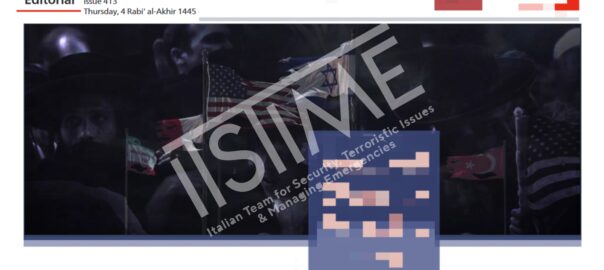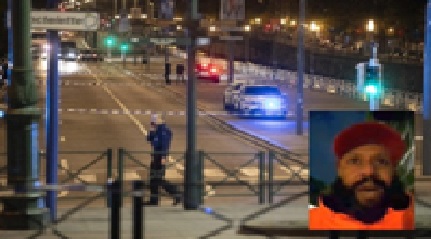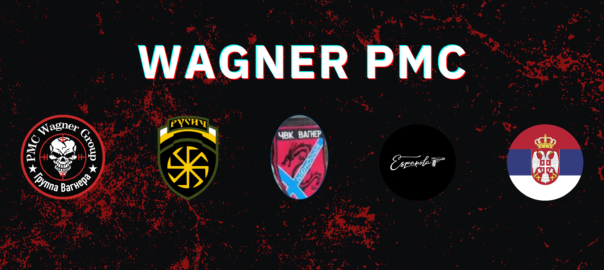The recent Hamas attack has brought the Israeli-Palestinian conflict back into the international spotlight, and this has awakened the communication of the main jihadist groups. With al-Qa’ida supporting Hamas and its actions, a statement on the attack by the Islamic State was expected. On 20th October, through the publication of the 413th issue of al-Naba, an official newspaper issued by the Central Media Office of the Islamic State, IS expressed its position.
Continue readingCategory Archives: Terrorism
Nuovi attacchi estremisti in Europa e strumenti di valutazione della minaccia: una riflessione critica sui TRA-Is – by Barbara Lucini
L’attentato estremista di lunedì 16 Ottobre a Bruxelles che vede la morte di due turisti svedesi ha riacceso l’attenzione sulla questione sicurezza e rischi attentati in Europa.
Continue readingEffetto Hamas: l’attacco a Israele e la nuova utopia radicale – by Sara Brzuszkiewicz
Nuovi allarmi bomba nelle scuole francesi, a tre anni di distanza dalla decapitazione di Samuel Paty, il professore che il 16 ottobre 2020 venne ucciso da Abdoullakh Abouyezidovich Anzorov, diciottenne ceceno rifugiato in Francia, dopo una campagna online contro il docente, colpevole di aver mostrato alcune vignette di Charlie Hebdo ritraenti il profeta Muhammad.
Continue readingTime to be realistic about Swarmcast2.0 – by Ali Fisher
For all the meetings, presentations and reports from embedded academics and industry groups, purporting to show success against Salafi-Jihadi groups, the movement is still comfortably able to disseminate content through Swarmcast2.0.
The Western metanarrative has long been accepted by the orthodoxy of Terrorism Studies. However, while claims of success resonate at events hosted by industry funded bodies, the challenge encapsulated by Swarmcast2.0 remains. Salafi-Jihadi groups and the media mujahidin maintain persistent networks which function across multiple platforms simultaneously.
Continue readingThe Necessary Sanctification of Ryan Palmeter – By Federico Borgonovo & Silvano Rizieri Lucini
On the 26th August 2023, a new far-right terrorist attack occurred in the United States. The attacker, Ryan Palmeter drove to a supermarket in a predominantly African-American neighbourhood and then opened fire with a PSA-15 semi-automatic rifle and a Glock G20. He then committed suicide when the police arrived. Evidence of the modus operandi adopted emerged from the information gathered in open source. We identified two types of information sources:
Continue readingPMC Wagner and Allied Mercenaries, Aftermath of the March by – Federico Borgonovo & Giulia Porrino
During the Russian-Ukrainian conflict, PMC Wagner exploited online and offline support of some military groups, including:
- Española, a parallel battalion of Russian ultras led by Alexander Shum and with a special training centre near San Petersburg.
- Rusich, a reconnaissance, sabotage and assault group, directly attached to the PMC Wagner.
- Serb members, active since the deployment in Syria. Those are linked with several ultras’ communities.
- Níðhöggr (Nidhogg), a little unit near to the Scandinavian right-wing militia funded by an actual Wagner member.
All these units were orbiting around the PMC Wagner as embedded support groups. Starting from their online propaganda we theorized a pro-Wagner alliance system (figure 1).
Continue readingTatarsky: implosione della rete? – by Giulia Porrino
Maxim Fomin, noto come Vladlen Tatarsky, influencer e membro del PMC Wagner è stato ucciso alle 18.30 ora locale a San Pietroburgo. In precedenza era stata evidenziata la centralità del canale di Tatarsky nella rete di reclutamento Wagner e come una sua eleminazione avrebbe probabilmente portato a una crisi all’intera rete.
Continue readingTerrorist plot in Greece reported to be thwarted: first comments on operational questions – by Maria Chr. Alvanou
Greek law enforcement authorities have announced that they have dismantled a terror network planning to conduct attacks in Greece[1]. According to media reporting on the subject, 2 men of Pakistani origin have been arrested as part of a terror network whose head is also Pakistani organizing the criminal activities from Iran. Continue reading
Correlation Is Not Causation: Wagner e migranti come attori della guerra cognitiva – by Giulia Porrino
Nella giornata di lunedì il Ministro della Difesa Guido Crosetto e il Ministro degli Affari Esteri Antonio Tajani hanno denunciato la presenza della PMC Wagner dietro l’aumento degli sbarchi sulle coste italiane, triplicati rispetto allo stesso periodo nel 2022. Secondo i Ministri si tratta di una strategia di guerra cognitiva che i mercenari russi stanno attuando per destabilizzare l’Europa. Non si è fatta attendere la risposta di Prigozhin (su Telegram), che ha negato di essere al corrente di quanto sta accadendo.
Continue readingPakistan sotto assedio di Tehrek-e-Taliban Pakistan: colpito il quartier generale della polizia a Karachi – G. Giacalone
Venerdì sera una cellula di jihadisti del gruppo Tehreek-e-Taliban Pakistan (TTP, i meglio noti “Talebani pakistani) ha lanciato un attacco suicida contro il quartier generale della polizia di Karachi, un complesso strettamente sorvegliato che ospita dozzine di edifici amministrativi e residenziali. Centinaia di agenti vivono infatti all’interno del compound con le loro famiglie. I suoni di spari ed esplosioni hanno scosso la città pakistana per diverse ore e soltanto in tarda nottata è arrivata la conferma da parte delle autorità locali della fine delle operazioni di “pulizia” che hanno coinvolto polizia, esercito ed anche forze paramilitari. Continue reading
Saif al-‘Adl nuovo leader di Al-Qaeda: prime considerazioni – by Sara Brzuszkiewicz
Risale a due giorni fa la conferma da parte del Dipartimento di Stato statunitense di quanto asserito poco prima dalle Nazioni Unite: Saif al-‘Adl, situato in Iran, è l’attuale leader di Al-Qaeda. Il report dell’Onu spiega che l’idea dominante proveniente dalle intelligence dei Paesi membri è proprio che sia al-‘Adl, egiziano di 62 anni, il successore di Ayman al-Zawahiri. Continue reading
PMC Wagner Propaganda Ecosystem – by Giulia Porrino & Federico Borgonovo
The Wagner propaganda ecosystem is fragmented and made up of different actors that we have categorized. We identified a “top-down” propaganda architecture, composed of different materials disseminated by the leadership of the Wagner company, exploiting traditional media such as television, movies, events, and newspaper. Examples of this are the construction of the Wagner Center in St. Petersburg and movies produced by Aurum Production owned by Prigozhin.
Continue reading











